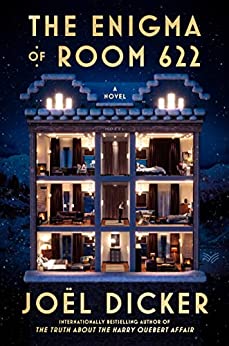More on this book
Community
Kindle Notes & Highlights
Nothing can help you feel less alone than to find someone more forlorn than yourself.
“People always think that writing a novel begins with an idea. But a novel begins most of all with a desire: the desire to write. A desire that grabs you and that nothing can stop, a desire so strong that you turn your back on everything else. That perpetual desire to write, I call the writer’s sickness. You can have the best plot for a novel, but if you have no desire to write, you’ll get nowhere.”
The magic of the novel is that even a simple fact, any fact, when presented as a series of questions, opens the door to a story.”
“Thanks.” I took a sip of coffee, then asked, “Scarlett, why do you smell so good?” “Because I took a shower. You should do the same, we’re meeting Arma in a half hour.”
“The man who can make you laugh can also make you live, for there is no finer feeling,”
“You’re the devil!” Macaire screamed. “I’m worse than the devil, because I exist.”
“According to Bernard, a great novel is a painting—a world offered to the reader who allows herself to be wrapped up in the immense illusion created by the author’s brushstrokes. The picture shows rain: you feel wet. A cold, snow-covered landscape? You start to shiver. Bernard would say, ‘You know what a great writer is? A painter. In the museum of great writers, to which all bookstores have a key, thousands of paintings await you. If you enter once, you’ll keep going back.’”
“Now that I’m about to bow out, I can say that I’ve wasted my life—always too eager to make money, too eager to run the world, too eager to acquire more power. By always wanting to determine the fate of others, we forget that we can only influence our own.
“What a strange invention—the couple—which always ends up making us feel alone when we’re together.
Eve ended up eating that apple because she was looking for a good reason to leave.
“No,” Lev said. “When we really want to believe in something, we see what we want to see.”
Where do the dead go? Wherever they can be remembered. Especially in the stars. For they continue to follow us, they dance and shine in the night, just above our heads.
Life is a novel whose conclusion we already know: in the end, the hero dies. The most important thing is not how our story ends, but how we fill the pages. For life, like a novel, must be an adventure. And adventures are life’s vacations.
Translation is a process that unfolds in stages. Interpretation is a first step toward translation, but it is not translation itself.
For long sections of the novel, the voice of the narrator, Joël, drops away and we are immersed in the world of the bank and its employees—Macaire,
We are then confronted with the problem of authenticity. Joël Dicker, the author, and Bernard de Fallois, his publisher, are real characters in a quasi-autobiographical novel narrated by a writer who greatly resembles Joël Dicker, who may even be Joël Dicker. Or not. And in this way, the novel turns in upon itself, like the ever-circling spirals of a gastropod shell.
Embedded within the structure of a crime novel, we find a kind of autofiction, a memoir by the protagonist-author, a retelling of his life, the origin story of a writer; he could be any writer but happens to bear a close resemblance to the author whose name appears on the cover of the book you are reading. However, and perhaps most important, this “fictional” memoir by a fictional writer is a real form of homage to Bernard de Fallois, the guide, mentor, and close friend of Joël Dicker, author.


